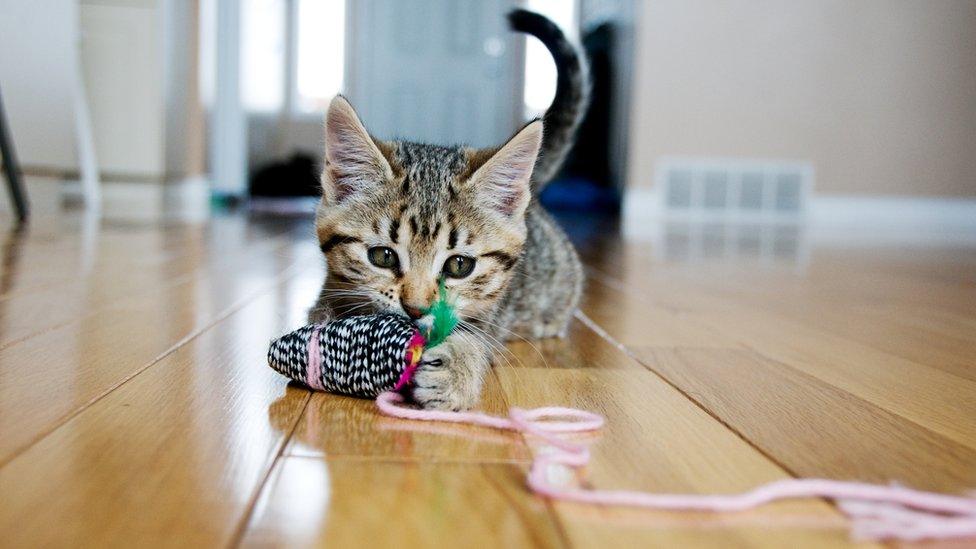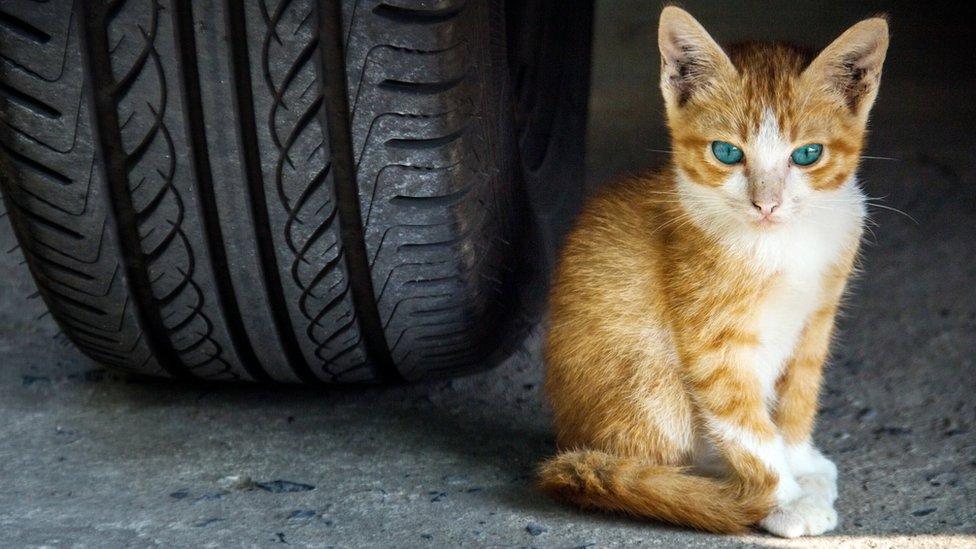Cat killer mystery solved, but how do we keep our pets safe?
- Published

Ukiyo was thought to be a victim of the Croydon cat killer
It was the murder mystery that kept police guessing and struck fear in the hearts of pet owners.
Now, Scotland Yard says the so-called Croydon cat killer, thought to have bludgeoned and decapitated cats across the UK, never existed.
Instead, cats were being run over and their dead bodies mutilated by foxes, they say. So what can you do to keep your cats out of trouble?
Should I keep my cat indoors?

Ideally no.
But, if you do, try to replicate the stimulation they get from the outdoor world, says Louise Lee of Blue Cross animal charity.
Cats like to hunt, so she suggests wrapping their biscuits in edible rice paper and hiding them around the house. You should also provide scratching posts and toys.
Deprived of this stimulation your cat might show their frustration, she says, by going to the toilet indoors or damaging furniture.
How common is it for cats to get run over?

It's difficult to say as any figures would not tell the full story.
There's no law making it necessary to report a dead cat nor for cat owners to fit them with a microchip, meaning the fate of a missing cat is not always known.
Some cats simply move away and find a new home to live in. Others might be injured, considered a stray and then rehomed.
And if a council finds a dead cat, it can throw it away without having a legal duty to inform the owner.
Sharon Harford, a veterinary nurse at Blue Cross's cat kennel in Victoria, central London, says she estimates treating at least one cat a week that's been injured on the road.
How can I help to stop my cat getting run over?

Give them a reflective collar
Most road traffic accidents happen at night so the RSPCA advises keeping them in overnight or restrict their access when traffic near you is at its busiest
Install cat-friendly fencing which stops them getting out the garden, the RSPCA suggests
Get them microchipped so they can be identified if they are lost
Get your cat neutered. When in heat, they have a very strong drive to mate and often stray beyond their usual neighbourhood which they are less familiar with
Would a curfew help?

Yes, says Louise Lee. Cats are hard-wired to hunt at dawn and dusk, during which time they can be so focused on chasing a bird for example, they aren't aware of oncoming cars.
But she advises that if you do put a curfew in place, they need to get that same stimulation in the home or garden.
Are foxes a danger?

Unlikely.
Blue Cross vet Caroline Reay, who works at Merton animal hospital in south London, says she's never seen a case of a living cat attacked by a fox. And two of her own cats were seen chasing off foxes - rather than the other way round.
The RSPCA has similar doubts. Charity spokesperson Hatti Mellor believes there will be incidences between foxes and cats but says it's far more likely that foxes will prey on cats once they are dead.
In the "Croydon cat killer" cases, the cats' heads and tails had been chewed off - easy meals for a scavenger, according to Professor of Environmental Sciences Stephen Harris, external.
What about risks from other cats?

They are territorial and solitary animals who will work out a kind of neighbourhood rota, says Louise Lee.
The cats will know who is out when and will do their best not to cross paths. If they do, there'll be a long face-off as they are not programmed to run off.
If you have a new cat, introduce them to the neighbourhood very slowly.
What can drivers do to keep cats safe?

Don't speed
Be vigilant of cats on the roadside
If you hit one, make sure it's ok. If it's not, take it to a nearby vet or report it to the RSPCA on 0300 1234 999
Report a dead cat, external to your council
- Published20 September 2018

- Published27 October 2017

- Published29 September 2017

- Published19 February 2016
